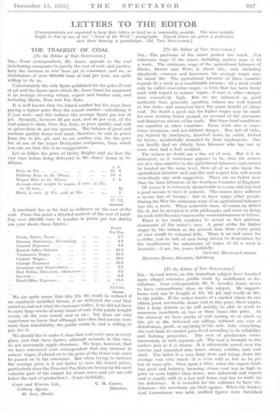[To the Editor of THE SPECTATOR.1 Sin,—The partisans of the
miner protest too much. The minimum wage of the miner, including surface men, is £2 a week. The minimum wage of the agricultural labourer of ITants, Dorset and Wilts is about 32s., and, including shepherds, cowmen and horsemen, his average wages may be about 86s. The agricultural labourer of these counties regards £2 a week as' a. comfortable income ; £2 a week could only be called starvation wages—a term that has been freely used with regard to miners' wages—if rent or other charges were excessively high. But we arc informed on good authority that, generally speaking, miners arc well housed at low rents, and moreover have the great benefit of cheap coal. No doubt a good case for higher wages may be made for men working below ground, on account of the strenuous and dangerous nature of the work. But these hard conditions are equalled in other vocations. Farm work also is some- times strenuous, and not without danger. Men fall off ricks, are injured by Machinery, knocked down by cattle, kicked by horses, accidentally wounded by farm implements. One can hardly find an elderly farm labourer who has not at some time had a bad accident.
The miners no doubt are a fine set of men. But if it be intimated, as it sometimes appears to be, that the miners are of a class superior to the agricultural labourers and cannot be treated on the same level,, then all of us who know the agricultural labourer well and like and respect him will resent exceedingly any such suggestion. There are no better men than the farm labourers of the Southern Counties of England.
Of course it is extremely disagreeable to a man who has had a good income to have it reduced. The miners have suffered a severe loss of income ; but so have many other people. During the War the minimum wage of an agricultural labourer was 45s. a week. When reduction came, of course he didn't like it, but he accepted it' with philosophy and went On doing his work with the same trustworthy conscientiousness as before.
There is too much tendency to accept as fact partisan statements of the miner's case. A great strike for higher wages by the miners at the present time from every point of view would be criminal folly. There is no real cause for a strike, and to talk of men being driven to desperation by the insufficiency for subsistence of wages of £2 a week is fantastic.—I am, Sir, yours faithfully,
GERARD BONIUM-CARTER:
Shrewton house, Shrewton, Salisbury.














































 Previous page
Previous page